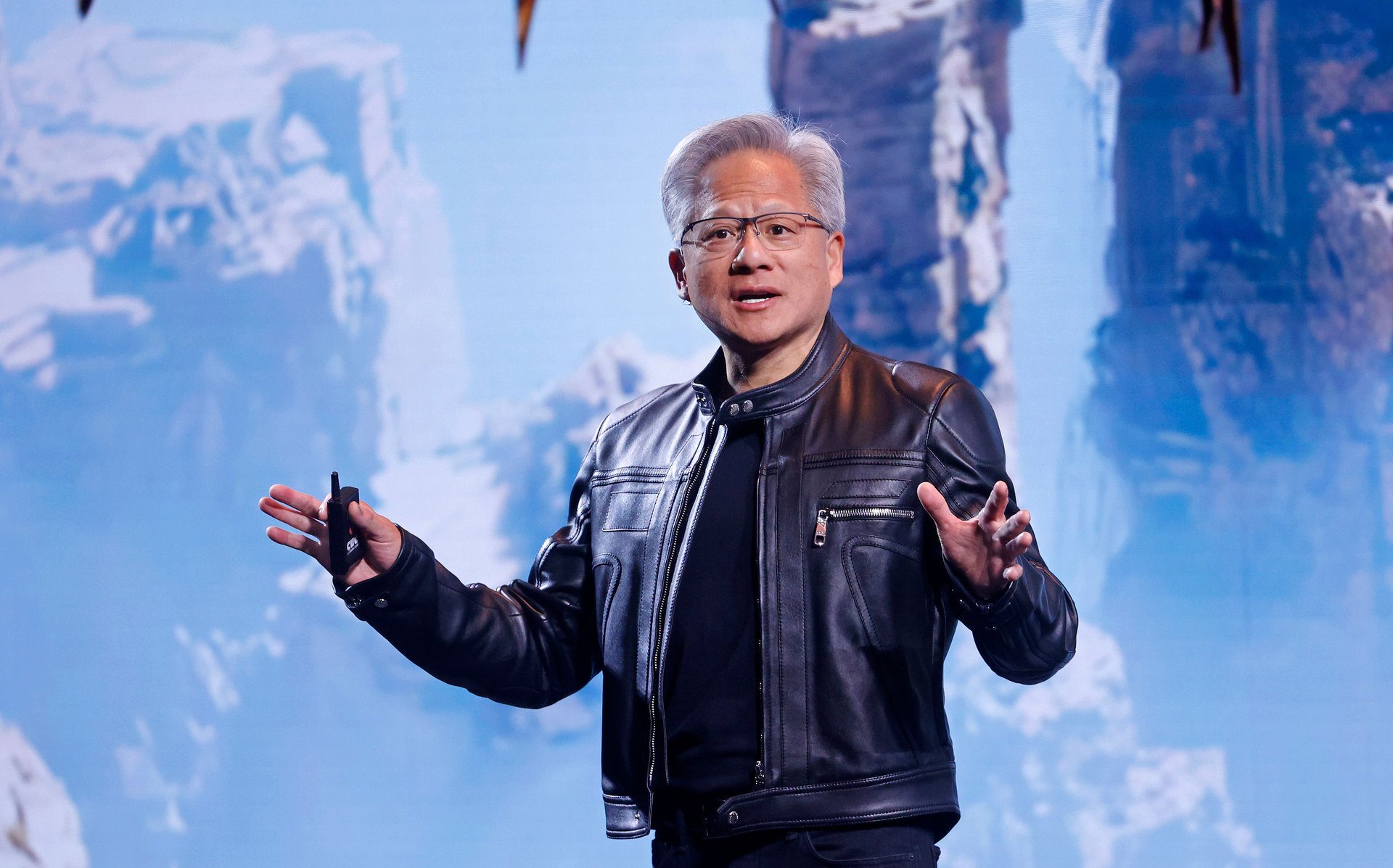Nvidia’s CEO says AI won’t take your job — but it will change it
As AI transforms industries, Jensen Huang says success won’t come from resisting change but from mastering it faster than everyone else

Photo by Chesnot/Getty Images
If your job feels safe from AI, it probably isn’t. But Nvidia CEO Jensen Huang isn’t sounding the alarm. He’s looking to draw the blueprint for what’s next.
Suggested Reading
In a recent interview on CNN’s “Fareed Zakaria GPS,” the man steering the world’s most valuable company didn’t talk much about any AI-related layoffs or mass obsolescence of human workers. Huang instead talked about change — not the kind that clears desks but the kind that quietly rewrites what work looks like, down to the last bullet point in your job description.
Related Content
“I’m certain [that] 100% of everybody’s jobs will be changed,” Huang told Zakaria. “The work that we do in our jobs will be changed. The work will change, but it’s very likely — well, my job has already changed … but I’m still doing my job.
Huang’s comments are a marked contrast to some of the more dramatic forecasts from other AI leaders. Anthropic’s Dario Amodei has been warning of an AI-caused “massacre” of white-collar jobs in fields such as law, accounting, and consulting. Huang’s view is instead less dystopian and more historical. He points to past technological shifts — from the Industrial Revolution to the age of personal computing — that raised productivity without reducing overall employment. The key, he told Zakaria, is ideas.
“If the world runs out of ideas, then productivity gains translate to job loss,” he said. “But over the course of the last 300 years, 100 years, 60 years, even in the era of computers, not only did productivity go up, employment also went up.”
That dynamic, he says, depends on how AI is used. Rather than eliminating roles, the technology opens up capabilities to people who previously couldn’t access them. Huang called AI “the greatest technology equalizer we have ever seen” because it “lifts the people who don’t understand technology.”
“If you’re not sure how to use it, you ask ChatGPT, ‘How do I use you?’” Huang said. “It’ll write the question nicely for you, and then you ask it to answer the question.” For him, the proof is in how quickly everyday users have adopted AI tools such as ChatGPT — and in how easily those tools teach people to use them.
This, he says, is how AI narrows the technology gap.
“AI empowers people. It lifts people,” Huang said. “And as a result, more and more people are going to be able to do more things.” His comments to Zakaria mirror a February interview with World Wide Technology, where Huang said, “No AI can replace 100% of a job, but many can replace 80% of what we do.”
AI’s impact isn’t theoretical. The technology is already affecting almost everything. Tasks are changing, workflows are shifting, and users are getting more out of less. The software may be complex, but the barrier to entry is lower than ever. What emerges is less about automation and more about access. And the winners, Huang suggests, won’t be those who resist AI — they’ll be the ones who figure out how to wield it faster, better, and more creatively.
The billionaire said he treats AI “like getting three doctors’ opinions.” He asks the same question to several AIs, prompts them to critique one another, and then synthesizes the best output — a process he sees as sharpening cognitive skills, not eroding them. He said that, “as a CEO, I spend most of my time asking questions, and 90% of my instructions are actually conflated with questions.”
Huang doesn’t deny that there will be disruption and job loss. Some jobs will disappear. But millions more could be created, especially in areas starved for labor. If AI improves productivity across sectors — especially in those industries that are facing labor shortages — it could help fuel growth, not just efficiency. “Around the world, we’re about 30 to 40 million skilled labor short,” he said. “If we fill those jobs with robots, the industries will grow, the economy will grow. It’ll create more prosperity. It’ll create more opportunity.”
With AI-powered tools and robotics filling some of those workforce gaps, industries expand. And so do economies.
If that sounds like techno-idealism, it’s more like strategic positioning. Nvidia has become the world’s most valuable semiconductor company on the back of that exact premise: that the future of work isn’t fully automated — it’s augmented. And whoever builds the tools for that future wins. But again, the future of work largely hinges on ideas. Innovation is the lever and, without it, AI could indeed reduce the need for human labor. With it, productivity becomes a possibility, not redundancy.
“I think the fundamental thing is this: Do we have more ideas left in society?” Huang said. “And if we do, if we’re more productive, we’ll be able to grow.”
